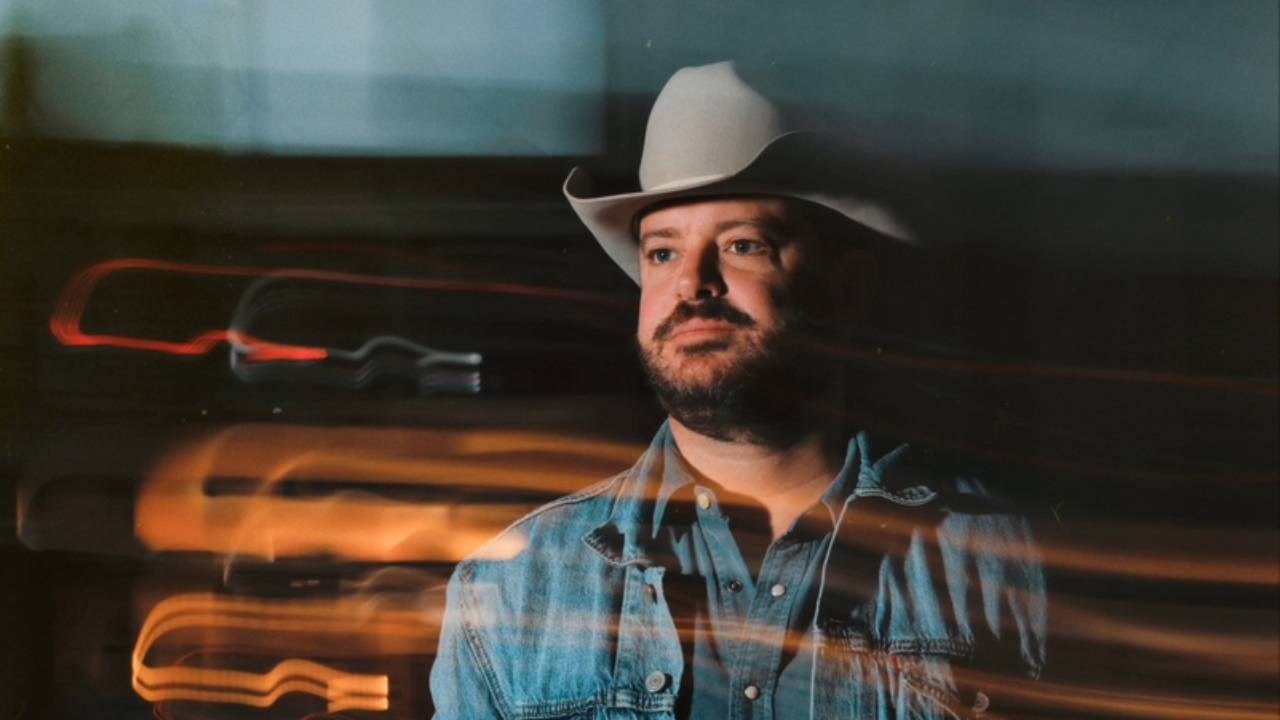Bobby Pinson Tells What He Knows

Bobby Pinson recently made his first appearance onstage at the CMA Music Festival, but it wasn't his first time to work at the event. Some years ago, he helped control the lines of fans gathered at an autograph booth.
"You know the little guy who holds the 'stop' paddle?" he says. "That was me."
Pinson's ability to weave complex and sometimes tragic themes into his music has resulted in glowing reviews for his debut album, Man Like Me.
His talent for painting pictures with words comes through even when he's describing his hometown of Panhandle, Texas, a community of 2,300 located near Amarillo.
"It's the county seat of Carson County," he says during a conversation at CMT.com's office. "It's the land of wind and dirt. It's the land of wheat. I lived in a little house on the end of the street. There was a little farm-to-market road that ran right beside our house. And on the other side of that road was the beginning of a 14-mile wheat field.
"I didn't know there was any other place in the world. ... It was great. I never really realized how flat it was until I went back to a family reunion about five years ago. But it's still beautiful to me."
As a child, Pinson became enthralled with Shel Silverstein's classic children's books, including Where the Sidewalk Ends and A Light in the Attic. At the time, he was not aware that Silverstein had written hundreds of songs, including Johnny Cash's "A Boy Named Sue."
"I didn't realize that, and you wouldn't have thought that with just reading the poetry," he says. "The poetry is innocent, and the songs aren't."
With Silverstein as a start, Pinson was later influenced by Johnny Cash, Willie Nelson, Kris Kristofferson, Bruce Springsteen and Steve Earle while his family moved from town to town as he was growing up.
"My dad was a football coach," Pinson says. "A bad football coach in Texas moves around a lot, and a good football coach moves around more. A lot of our moving was transitions between him starting out as an assistant coach and going to a bigger school as head coach."
The moves later inspired a line in his first single, "Don't Ask Me How I Know," still climbing the country chart.
"I went to four different high schools and played ball at all of them," he says. "There's a line in my song that says, 'Don't quit your high school football team halfway through the season.' That wasn't the case with me. With me, I played 'til they made me quit." He laughs, "Until they said, 'Hey, you're just too slow.'"
In small towns, there seem to be two types of people: those who stay there and those who want to get out.
"I definitely was the guy who wanted to get out," he says. "But not in a negative way. In my music, there's always that guy who's drinking and raising hell and stays there, and then there's the guy that's drinking and raising hell in the seat right beside him that leaves and quits raising hell. I was kind of the guy driving the car that wasn't drinking until later in life."
Because of his work in high school plays, a university near Tulsa, Okla., tried to recruit him to join its theater program. When he visited the campus, he suddenly knew he didn't want to be there.
"I was a middle linebacker," he explains. "So I showed up with my letter jacket, and I see these kids with the trench coats and the peace earrings and the combat boots. I'm like, 'That's not my deal.'"
Instead, he joined the Army.
"I still have that competitive thing," he admits. "I went in the military as just kind of that gung-ho guy. I was in there three years. At the end of that, I'd already started playing with a band. Fort Ord, Calif., where I was stationed, was closing down and moving its operations to Fort Lewiston. My little band that I'd started would come on post and rehearse in the mess halls. If there's a sound you can equate with rehearsing in the cafeteria, we had it. It was awful. But we got better."
As they got better, they started playing on the West Coast and then at clubs throughout the nation when the line dancing craze was at its peak.
"Your worth as a band was how many line dances you knew and if you could you call them out," he says. "About a year later, we started playing the 'A' rooms across the country. They'd put you up in a band house for a week, and you played five days a week for all these line dancers." He laughs, "You're opening for the dance instructor."
While on the West Coast, Pinson met country songwriters Paul Nelson and Larry Boone, who urged him to move to Nashville. He did so in January 1996.
"I moved here with a sack full of songs I shouldn't have brought with me and had lunch long before I should have had a lunch in this town," he says.
It was in no way an overnight success story. Just to survive financially, Pinson worked a series of jobs. He bought and sold junk at auctions and delivered phonebooks from door-to-door. The hardest was stacking and loading wooden ties for the Santa Fe Railroad.
"They'd give me a nickel a tie for putting these railroad ties on a truck," he says. Little by little, though, his songs turned up on albums by LeAnn Rimes, Blake Shelton, Tracy Lawrence, Trent Willmon and, most recently, Van Zant.
Although Pinson can write songs about love, his best work involves other concepts and human emotions.
"There's so much more to do in this world than to love somebody and fall out of love," he says. "I love my life, and I love people. I'm not an angry guy. There's some anger in the record because we all have angry spots. There's some lonely in the record because we all have lonely spots. There's some angst in pretty much all of it because I'm just a heartfelt guy, and I don't think anybody else is going to believe me if I don't [believe myself].
"I'm not going to preach to you about what I've done," he adds. "I'm coming from the standpoint of 'I've been the idiot.' And people listen to the idiot before they listen to the guy on the soapbox. I think because this isn't the typical, down-the-middle record is why it took so long to make it happen. I've been here since '96 and pretty much have been trying to get a deal since '99. Some of the songs on this record are four years old, but I'm glad I didn't get a deal when I first tried because it wouldn't have been this record."





